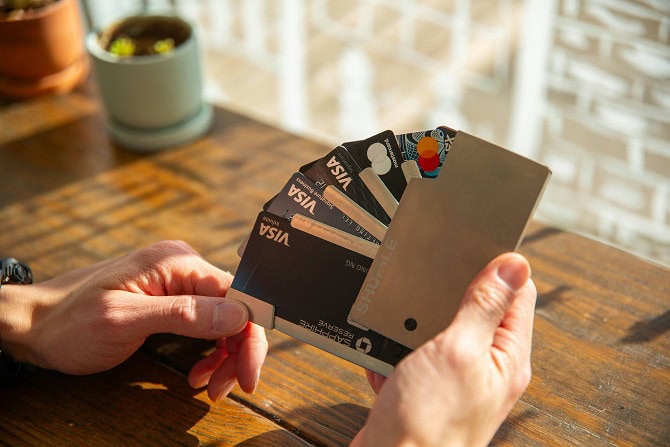
Things to Consider Before You Cancel a Credit Card
The average New Mexican is carrying about $5,851 in credit card debt. While our state’s average credit card balance is lower than other states in the U.S., carrying a balance from month to month on your credit card can still be damaging to your finances. So, whether you are thinking about closing a credit card account in order to pay off the balance, or you are simply decluttering your finances and have a credit card account you no longer use, this article will help you decide whether closing the account is the best option for your finances and credit score. Keep reading before you cancel a credit card!

What To Know Before Closing Your Credit Card
Canceling a credit card may seem like an easy fix for overspending or reducing the clutter in your wallet. However, there are important considerations to think through before you take action.
- Credit Score: Closing your credit card account may temporarily lower your credit score. This is because total credit limit and length of credit history are two important factors that determine your score. The impact on your credit score will depend on the credit limit for the account you’re closing, as well as how many other credit card accounts you have open. Additionally, ask yourself how long you’ve had this card. If it is your newest open account, it won’t hurt your score as much as if it’s one of your oldest accounts.
- Annual Fees and Rewards: Is it worth it to keep the card open? Will you be forfeiting points or miles you haven’t used yet? On the other hand, if it has a high annual fee, you may not be using enough of the benefits and rewards to make the annual fee worth it.
- Alternatives: Contact the issuer of your credit card to see if there are any alternatives you can switch to without closing your account. For example, if the annual fee is the problem, you may be able to downgrade to a no-fee card in the same portfolio.
- Recurring Payments: Do you have any automatic payments connected to the card you’re looking to close? If so, you’ll want to move those payments to another credit or debit card before closing the account.
- Current Balance: Some card issuers won’t let you close a credit card account until the balance has been paid off. So, figure out whether you need to pay off or transfer the balance to another card before closing the existing account.
- Goals and Reasons: Why do you want to cancel this particular personal credit card? There may be other ways to achieve the same goal without closing the account.
- Number of cards: Is this your only credit card account? There are certain circumstances, such as renting a car or reserving a hotel room, when a credit card may be necessary or at least more convenient.

So, how do you cancel a credit card?
If you’ve considered other options besides canceling your credit card and decided to cancel it anyway, there are a few things you need to make sure to do before you can officially cancel the card. Here’s how to cancel a credit card:
- Pay off the remaining balance on the credit card.
- Cancel any recurring payments or scheduled transactions that you had set up for the credit card.
- If you have any pending rewards points or cash back, make sure to redeem them prior to closing the account. Most of the time, rewards will expire after an account is closed and you’ll lose access to them. In this case, the best option would be to redeem any pending rewards or points for statement credit to lower the remaining balance of the credit card.
- Call your credit card company and let them know that you want to cancel your credit card. Ask for confirmation in writing to be sent to you in an email or a mailed letter from the issuer to confirm that your card has been canceled. Keep this document in a safe place.
- Check your credit report 30 to 45 days after you canceled the card. You should expect to see a report that the account was closed by the cardholder/issuer and that the balance is $0. If you don’t see it, you should contact the credit bureaus to verify that they’ve issued the cancellation of the card.

Does canceling a credit card hurt your credit score?
The short answer is yes–canceling a credit card will have a negative impact on your score, at least in the short-term. Generally, this impact will disappear within a few months if you maintain positive activity with your other credit accounts. As mentioned above, the two primary impacts from closing your credit card include:
- Credit utilization ratio: This is calculated by dividing the balance of your debt against the total credit limit on your cards. If you close a credit card, even with a zero balance, that brings your overall credit limit down and therefore increases your credit utilization ratio with the existing remaining balance from your other cards.
- Impact on length of your credit history: It’s always best to keep open your oldest credit card account because the longer your credit history is, the more positive an impact it has on your credit score. The longer an account has been open, the better it is. You also want to be careful not to close accounts that are new or recently opened. Closing accounts too quickly after opening them can indicate that you are a risky credit holder to lenders and credit card companies and potentially get you flagged. This is especially true with young people with short credit histories.
When is it okay to cancel a credit card?
Still wondering if closing your credit card account is the right move? Check out these reasons when it makes the most sense to close a credit card:
- High APR
- High Fees
- Reduction in Rewards and Benefits
- Divorce or Separation
- Outstanding Debt
- Overspending or an Inability to Reduce Balance

What are the alternatives to canceling a credit card?
If you’re going to leave your credit card account open, but want to stop using it, you could put it away safely in a drawer, filing cabinet, or office storage where you’ll remember where it is, but it’s out of the way of everyday use. Once you’ve paid the card off entirely, just put it in storage indefinitely. That way you’ll keep the account open while removing any chance that you’ll be impulsively using it on a day-to-day basis.
If you want to cancel your card because you’re tired of paying high annual fees, you can contact the credit card issuer and see if there is any flexibility in lowering your monthly fee for reduced perks or benefits or reducing your membership level to a more cost-effective tier.
Also, consider taking advantage of promotional offers for balance transfer cards in New Mexico. Card issuers, as well as banks and credit unions like DNCU, often have special promotional offers a few times a year for specific types of cards such as debt consolidation and balance transfers, travel rewards points, credit builders, etc. It may be worthwhile to go this route instead of canceling your current account all together.

Transfer your high interest credit card debt to DNCU today and save!
Are you having trouble making progress paying off your credit card debt because the balance is so high? Transfer your high interest credit card debt to DNCU today and save! If you’re looking for balance transfer offers in New Mexico, check out our low rates, no balance transfer fees, no annual fees, and no cash advance fees ever. A personal loan for credit card debt is another way to lower your interest rate and consolidate debt. Don’t have a balance to transfer? See the DNCU credit union credit cards we offer and find your best fit! Apply online today!
Not yet a DNCU member? Becoming a member of DNCU is quick and easy. In addition to New Mexico credit cards, we also offer checking accounts, online and mobile banking, and more. Join now online!
This article on considerations before canceling a credit card is provided for informational purposes only and should not be construed as financial advice. Contact your financial institution or financial planner for advice on your specific credit or financial situation.
To view applicable terms and disclosures for rate advertised, visit Rates & Fees. Actual rate determined at time of application based on creditworthiness. APR = Annual Percentage Rate. To learn more about factors to consider when applying for or using a credit card, visit the website of the Consumer Financial Protection Bureau at http://www.consumerfinance.gov/learnmore

